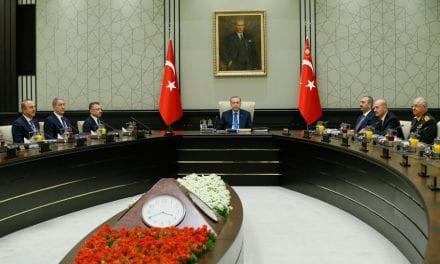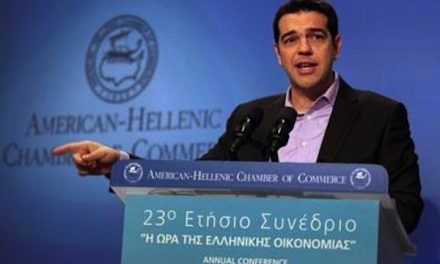By MATT FLEGENHEIMER and MAGGIE HABERMAN
One day after Senator Ted Cruz’s decisive victory in Wisconsin, the Republican presidential race hurtled on Wednesday into conspicuously different terrain — New York City and its suburbs — with Republicans opposed to Donald J. Trump more hopeful than ever that the front-runner can be bruised anew, even in his hometown.
Immediately, the two leading contenders revealed their dueling electoral strategies as the primary calendar drifts to the Northeast.
In a show of force intended to reassert himself as a catalyst of voter passion and populist fury, Mr. Trump drew thousands of supporters to a rally on Long Island, filling a cavernous film studio with many of the blue-collar white voters who have powered his bid and are crucial to his winning statewide.
“First of all,” he said to raucous cheers, “it’s great to be home.”
Mr. Cruz, exulting in his Midwestern triumph, made a beeline for a slice of New York that even local Republicans have long neglected: the overwhelmingly Democratic, majority-minority Bronx.
The appearance reflected Mr. Cruz’s plan in New York and beyond, especially in states he is unlikely to win: He does not have to beat Mr. Trump, some allies say, despite Mr. Trump’s wide lead in delegates. Mr. Cruz must simply continue amassing the delegates necessary to keep Mr. Trump from attaining a majority before the Republican convention.
That fight will be waged, street by street if not stoop to stoop, in places like the Bronx, where Mr. Cruz’s team believes its advantage in voter outreach and organization can yield delegates in areas with few Republicans.
On Wednesday, at a Chinese-Dominican restaurant beneath the roar of an elevated subway line, the Texas senator did not shy away from his past attacks on Mr. Trump’s “New York values.”
Lost in Mr. Cruz’s swaggering display was his current position in many of the forthcoming states — particularly New York, where his message of conservative purity and religious faith is not a natural fit — and the obstacle posed by Gov. John Kasich of Ohio in these moderate areas.
A Monmouth University poll released on Wednesday placed Mr. Cruz far behind in New York, with the support of 17 percent of likely primary voters. Mr. Trump was first at 52 percent. Mr. Kasich received 25 percent.
Like Mr. Cruz, Mr. Kasich stands to benefit from the way New York apportions most of its presidential delegates: Three are awarded in each of the 27 congressional districts, all of them to a candidate who wins a majority, or short of that, two to the winner and one to the second-place finisher.
Mr. Kasich plans to campaign across the state, with visits planned for Brooklyn on Thursday and around Syracuse, Rochester and north of New York City in the coming days. His campaign, which began last month with a little more than $1 million cash on hand, nonetheless insists Mr. Kasich has the money to advertise in the state.
And while Mr. Cruz has long argued that Mr. Kasich is helping Mr. Trump by staying in the race, some Republicans hoping to stop Mr. Trump are hopeful that the Ohio governor will prove useful in denying him delegates. Mr. Trump has other ideas.
Appearing invigorated, even overwhelmed, by the rollicking, screaming, sign-waving reception in Bethpage — where a man kept shouting, “I love you Trump!” — Mr. Trump repeatedly brandished his local ties. He spoke of growing up in nearby Queens, and of sneaking out to Bethpage for an early-morning round of golf. He lamented that the nation had gone soft: “We don’t fight like people from Long Island,” he said. “We don’t fight like people from New York.” And he suggested that New Yorkers had little use for a certain Texas senator.
“You know, lyin’ Ted came today — he couldn’t draw 100 people,” Mr. Trump said, reminding the crowd of Mr. Cruz’s scornful dismissal of “New York values.”
“I think you can forget about him,” Mr. Trump added. “Fuhgedaboutim.”
As Mr. Trump spoke, his new adviser, Paul Manafort, watched from the side of the room with other campaign aides. Mr. Manafort was recently brought on to manage Mr. Trump’s convention strategy, and he held a lengthy private meeting with the candidate at Trump Tower in Manhattan to discuss urgent changes that need to be made to maximize the candidate’s chances of securing the nomination, according to two people briefed on the meeting.
So far, New York’s elder statesmen are not uniting behind Mr. Trump in the primary. George E. Pataki, the former governor and presidential candidate who has been vocally opposed to Mr. Trump, met recently with Mr. Cruz but has not endorsed anyone. Alfonse M. D’Amato, the former senator, is supporting Mr. Kasich.
That leaves Rudolph W. Giuliani, who has not endorsed anyone, but who had been a loyal defender of Mr. Trump in many interviews. Yet since Mr. Trump posted on Twitter an unflattering photo of Mr. Cruz’s wife, Heidi — juxtaposed against one of Mr. Trump’s wife, Melania, a former model — Mr. Giuliani has been absent from public view.
Mr. Giuliani did not return repeated messages seeking comment about his views of that Twitter post.
Mindful of Mr. Trump’s potential strength, the main outside groups opposed to his candidacy have not yet decided how aggressively to attack him in New York.
On Wednesday, the two best-financed anti-Trump groups, the Club for Growth and Our Principles, were still reveling in their Wisconsin success, while quietly assessing how they could be most effective. “Last night was, I do believe, a real pivot point in the campaign,” said David McIntosh, who runs the Club for Growth. “The most likely scenario is now an open convention.”
Neither group is likely to purchase broadcast ads in the costly New York City market, but they are considering doing so in some of the more modestly priced upstate cities where the spending could have a greater impact and where Mr. Trump may be more vulnerable.
But even as they wait to see if the Wisconsin results appreciably changed the state of the New York race, the two anti-Trump groups are looking elsewhere — with plans, for example, to compete aggressively in Indiana, a stand-alone primary on May 3.
Mr. Cruz, whose campaign has prided itself on competing even in states viewed as long shots, suggested that he had no plans to cede New York: On Thursday, he plans to visit a matzo bakery in Brooklyn.
On Wednesday, down the block from a Kennedy Fried Chicken, a “Bangladeshi-Indian-Pakistani-African-American” deli and a purveyor of “lady toys” and “karate movies,” Mr. Cruz held forth with a group of ministers while supporters, protesters and occasionally confused patrons filled the restaurant. “Ted Cruz has no business being in the Bronx!” one attendee, who identified himself as Rodrigo Starz, shouted before being escorted out by the police. (He and a peer were critical of Mr. Cruz’s views on immigration and climate change.)
One of Mr. Cruz’s hosts, Ruben Diaz Sr., a Democratic state senator and minister who is staunchly conservative on social issues, said the protests had reinforced Mr. Cruz’s criticism of “New York values.”
“They’re giving him the reasons,” he said, beneath his customary cowboy hat.
Speaking to reporters afterward, Mr. Cruz was asked in Spanish about bringing his hard-line message on undocumented immigration to a community of immigrants. “Our community, the Hispanic community,” Mr. Cruz began, before the reporter asked if the candidate could answer in Spanish. He said he understood the language better than he could speak it, before sprinkling in a bit of what he called “Spanglish.”
“I think the most powerful value in the Hispanic community is the American dream,” he said. Moments later, Mr. Cruz stepped out of the restaurant, Sabrosura 2, and onto Westchester Avenue, where his car waited below the hum of a No. 6 train.


















